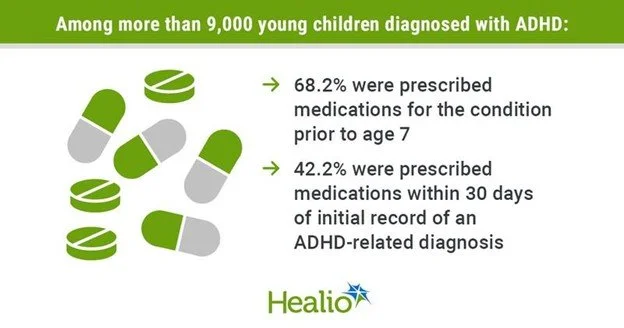ADHD Medication Prescribed Early in Preschool-aged Children Despite Guidelines
From Healio 09/09/2025
(Reprinted with Permission by Healio Gastroentorology)
Key takeaways:
Asian, Black and Hispanic children with ADHD were less likely to be prescribed medication early vs. white children.
There is a need for more nonpharmacologic interventions in this population, researchers said.
A significant number of children were prescribed medication before the age of 7 and often within 30 days of an initial ADHD or related diagnosis despite treatment guidelines recommending therapeutic interventions, data show.
“This study has outlined for the first time the timing of medication prescriptions given to preschool-age children with ADHD or ADHD symptoms,” Yair Bannett, MD, assistant professor of pediatrics at Stanford Medicine, told Healio about the research published in JAMA Network Open.
Data were derived from Bannett Y, et al. JAMA Netw Open. 2025;doi:10.1001/jamanetworkopen.2025.29610.
“Our study findings clarify the urgent need to investigate the reasons behind early medication prescriptions and to increase the use of non-pharmacological interventions for young children with ADHD,” he said.
Prior research has established that early identification and treatment of ADHD in preschool-age children is crucial for addressing potential social, emotional and academic problems, Bannett and colleagues wrote.
Current therapeutic guidelines suggest that this population undergo at least 6 months of behavioral therapy before medication is prescribed. However, ongoing research suggests children in this age group and children of younger ages are being prescribed medication as soon as a diagnosis is made.
Bannett and colleagues sought to examine variation in rates of ADHD identification, as well as the rates and timing of medication initiation in children aged 3 to 5 years in primary care settings and to identify factors involved with the variations in time between initial diagnosis and prescription.
Their retrospective cohort study culled data from electronic health records from primary care clinics affiliated with eight academic institutions participating in the PEDSnet Clinical Research Network. The researchers included children aged 3 to 5 years, seen two or more times in a primary care clinic with at least a 6-month follow up between 2016 and 2023.
Among an initial yield of 712,478 children aged 3 to 5 years seen in primary care, 9,708 (1.4%) were diagnosed with ADHD between ages 4 and 5 years, with a median age of first diagnosis related to ADHD of 5.31 years. From those diagnosed, 76.4% were male, 39% were white and 31% were Black.
According to results, 6,624 (68.2%) of children with ADHD were prescribed medications for the condition prior to age 7 years. These medications included stimulants (n = 5,131; 77.5%), nonstimulants (n = 1,108; 16.7%) and both (n = 385; 5.8%).
In addition, 4,092 (42.2%) children were prescribed medications within 30 days of the first documentation of an ADHD-related diagnosis, and 1,373 (14.1%) were prescribed medications more than 6 months later.
Median times from diagnosis to prescription included 390.5 days for children aged 3 years (n = 264), 28 days for children aged 4 years (n = 1,550) and zero days for children aged 5 years (n = 4,810).
The researchers reported that Asian (aHR = 0.51; 95% CI: 0.38-0.68), Hispanic (aHR = 0.75; 95% CI: 0.70-0.81) and Black (aHR = 0.88; 95% CI: 0.83-0.94) children with ADHD were less likely to be prescribed medication early compared with white counterparts.
Additionally, early prescriptions were more likely to occur in older vs. younger patients (aHR, 1.62; 95% CI: 1.55-1.69), male vs. female patients (aHR, = 1.17; 95% CI: 1.11-1.25) and publicly insured vs. privately insured patients (aHR = 1.09; 95% CI: 1.03-1.15), as well as among patients with sleep problems (aHR = 1.23; 95% CI, 1.16-1.31) and those with disruptive behavior disorders (aHR = 1.21; 95% CI, 1.14-1.29).
Data further showed that PCPs documented comorbid conditions in 65% of patients, with the most common being language delay or disorder (33.3%), sleep problems (19.4%) and disruptive behavior disorders (19.2%).
“The study emphasizes the need to educate clinicians and families about the principles of behavior management therapy and about the evidence of its utility in improving outcomes of young children with ADHD,” Bannett said. “It is also important for clinicians to have clear indications for starting medications for children 4 to 5 years old with ADHD that are driven by clinical need and shared decision-making with the family.”
Reference:
ADHD drugs are being prescribed too quickly to preschoolers. https://med.stanford.edu/news/all-news/2025/08/adhd-preschoolers.html. Published Aug. 29, 2025. Accessed Sept. 3, 2025.
For more information:
Yair Bannett, MD, can be reached on social media at X here, and on Facebook here.
CITATION. Reprinted with Permission by Healio Gastroentorology.


